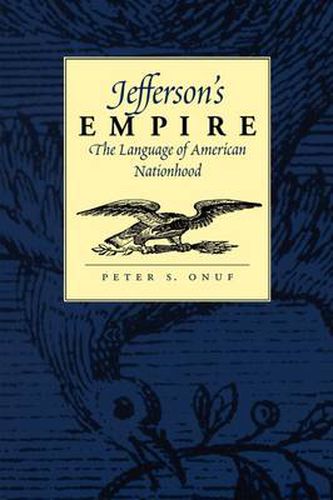Readings Newsletter
Become a Readings Member to make your shopping experience even easier.
Sign in or sign up for free!
You’re not far away from qualifying for FREE standard shipping within Australia
You’ve qualified for FREE standard shipping within Australia
The cart is loading…






This title is printed to order. This book may have been self-published. If so, we cannot guarantee the quality of the content. In the main most books will have gone through the editing process however some may not. We therefore suggest that you be aware of this before ordering this book. If in doubt check either the author or publisher’s details as we are unable to accept any returns unless they are faulty. Please contact us if you have any questions.
Thomas Jefferson believed that the American revolution was a transformative moment in the history of political civilization. He hoped that his own efforts as a founding statesman and theorist would help construct a progressive and enlightened order for the new American nation that would be a model and inspiration for the world. Peter S. Onuf’s new book traces Jefferson’s vision of the American future to its roots in his idealized notions of nationhood and empire. Onuf’s unsettling recognition that Jefferson’s famed egalitarianism was elaborated in an imperial context yields strikingly original interpretations of our national identity and our ideas of race, of westward expansion and the Civil War, and of American global dominance in the twentieth century.
Jefferson’s vision of an American empire for liberty was modeled on a British prototype. But as a consensual union of self-governing republics without a metropolis, Jefferson’s American empire would be free of exploitation by a corrupt imperial ruling class. It would avoid the cycle of war and destruction that had characterized the European balance of power.
The Civil War cast in high relief the tragic limitations of Jefferson’s political vision. After the Union victory, as the reconstructed nation-state developed into a world power, dreams of the United States as an ever-expanding empire of peacefully coexisting states quickly faded from memory. Yet even as the antebellum federal union disintegrated, a Jeffersonian nationalism, proudly conscious of America’s historic revolution against imperial domination, grew up in its place.
In Onuf’s view, Jefferson’s quest to define a new American identity also shaped his ambivalent conceptions of slavery and Native American rights. His revolutionary fervor led him to see Indians as merciless savages who ravaged the frontiers at the British king’s direction, but when those frontiers were pacified, a more benevolent Jefferson encouraged these same Indians to embrace republican values. African American slaves, by contrast, constituted an unassimilable captive nation, unjustly wrenched from its African homeland. His great panacea: colonization.
Jefferson’s ideas about race reveal the limitations of his conception of American nationhood. Yet, as Onuf strikingly documents, Jefferson’s vision of a republican empire-a regime of peace, prosperity, and union without coercion-continues to define and expand the boundaries of American national identity.
$9.00 standard shipping within Australia
FREE standard shipping within Australia for orders over $100.00
Express & International shipping calculated at checkout
This title is printed to order. This book may have been self-published. If so, we cannot guarantee the quality of the content. In the main most books will have gone through the editing process however some may not. We therefore suggest that you be aware of this before ordering this book. If in doubt check either the author or publisher’s details as we are unable to accept any returns unless they are faulty. Please contact us if you have any questions.
Thomas Jefferson believed that the American revolution was a transformative moment in the history of political civilization. He hoped that his own efforts as a founding statesman and theorist would help construct a progressive and enlightened order for the new American nation that would be a model and inspiration for the world. Peter S. Onuf’s new book traces Jefferson’s vision of the American future to its roots in his idealized notions of nationhood and empire. Onuf’s unsettling recognition that Jefferson’s famed egalitarianism was elaborated in an imperial context yields strikingly original interpretations of our national identity and our ideas of race, of westward expansion and the Civil War, and of American global dominance in the twentieth century.
Jefferson’s vision of an American empire for liberty was modeled on a British prototype. But as a consensual union of self-governing republics without a metropolis, Jefferson’s American empire would be free of exploitation by a corrupt imperial ruling class. It would avoid the cycle of war and destruction that had characterized the European balance of power.
The Civil War cast in high relief the tragic limitations of Jefferson’s political vision. After the Union victory, as the reconstructed nation-state developed into a world power, dreams of the United States as an ever-expanding empire of peacefully coexisting states quickly faded from memory. Yet even as the antebellum federal union disintegrated, a Jeffersonian nationalism, proudly conscious of America’s historic revolution against imperial domination, grew up in its place.
In Onuf’s view, Jefferson’s quest to define a new American identity also shaped his ambivalent conceptions of slavery and Native American rights. His revolutionary fervor led him to see Indians as merciless savages who ravaged the frontiers at the British king’s direction, but when those frontiers were pacified, a more benevolent Jefferson encouraged these same Indians to embrace republican values. African American slaves, by contrast, constituted an unassimilable captive nation, unjustly wrenched from its African homeland. His great panacea: colonization.
Jefferson’s ideas about race reveal the limitations of his conception of American nationhood. Yet, as Onuf strikingly documents, Jefferson’s vision of a republican empire-a regime of peace, prosperity, and union without coercion-continues to define and expand the boundaries of American national identity.